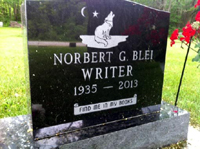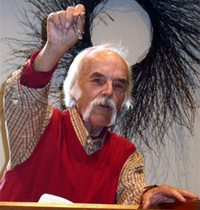POETRY DISPATCH #384 | November 12, 2012
ALICE D’ALESSIO
Editor’s Note: I have one small problem with CONVERSATIONS WITH THOREAU, which has nothing to do with this thoughtful and moving collection of Alice D’Alessio’s latest work, her third book of poetry, following A BLESSING OF TREES and DAYS WE ARE GIVEN.
My problem with this book is the same problem I have with a number of small and independent publishers and editors who too often fail to see the whole picture. By this I mean the total presentation of a book.
No one’s got a lot of money to throw at this heroic endeavor: keeping the good word alive via the small and independent presses when the big ones won’t touch this stuff—for all the obvious reasons, and then some. However, these editors and publishers are the true keepers-of-the-flame when it comes to keeping hope alive in some of our youngest, oldest, often obscure writers in the country. There ought to be an annual award (and a big hunk of national financial support) for them, but there isn’t and will never be because …it’s never there for the outsiders, the risk-takers, the small guys who publish for the love of the work, do what they do, what they must, for all the right reasons.
Yet…
I still have a problem with some of their work. A problem, in this case, with the cover of Alice’s book. It’s the WRONG cover. Hard to believe, given what resources a university-based press might draw from. A cover that borders on cheap, flashy, ugly, out-of-synch, unbecoming to the beauty and power of the poetry to be found on the pages within—where the book feels and looks a lot better. Good paper, good layout, design. Another good book added to a growing list of more than seventy-five Parallel Press books published to date. Quite an achievement in itself.
However, a writer of Alice D’Alessio’s talent, accomplishments to date, deserves better. That’s my main gripe. And it happens all too often in small press publications where sometimes the publisher/editor himself is a poor judge of the aesthetics of publishing…no sense of how a cover is the handshake, the first contact between reader and writer. How it should lead to beauty and design within–the total package. Should an editor find himself incapable of addressing these issues, he should either put all this in the hands of someone who does or seek to get better at this himself.
My problem with this book is magnified by the fact I am the publisher of Alice’s, BLESSING OF TREES, and I was aware of the early poems in this new book that were based on the poet’s “conversations with Thoreau” which I loved and encouraged from the beginning—what’s more, really longed to publish, by themselves, in a very small book, a very limited edition of maybe 50 copies, beautifully designed, illustrated—a total work of art in itself. Unfortunately, for all kinds of reasons, this did not come to pass.
But, we do have those poems and more (two other sections, “Revelations” and “Seeds of Hope”) in this Parallel Press edition. Which I highly recommend.
Alice’s grasp of the natural world speaks to us all in ways that make us better just hearing her words. I just wish the cover sang as much as the poetry within. — Norbert Blei

A Walk to Wachusett
H.D.T. from Excursions
May I join you, Henry,
to hike the Massachusetts hills?
The country open and fresh
the morning exuberant with birds:
a place where gods might wander
so solemn and solitary.You are seeking that blue boundary
of distant mountains, with only
your stout staff, a tent
and Virgil tucked under one arm.
I would come along.We’ll drink from springs
and scavenge wild berries,
unhurried for appointments.
We’ll pause to contemplate
our natural world, ample, roomy,
with time bounded by wide margins.Only an occasional farmer
to share his bread and milk,
and pique our interest with his strange accent-
in that halcyon time before trucks
when travelers had no fellow travelers
for miles, before or behind!And I know I was born too late
or that we’ll have to find each other
in some warp of time. You
and I and Virgil, perhaps, can strike off
to see those undiscovered
unmined mountains,
beyond wild fields and forests.

Our Holy Howling Mother
Here is this vast, savage, howling mother of ours, Nature, lying all around, with such beauty H.D.T. from Excursions
Bad news, Henry,
it’s hard to find Her anymore,
She’s been so scraped,
so raped, so scavenged.
And yet you’d be amazed to watch us
seek the relics left behind—
each lonely riff of trees,
each butterfly. Girded with late reports
we hurry to be the one who gets there first
who pokes the camera
at the purple prairie clover
chases the tattered Mourning Cloak
through ditches, races home
to post the photos on the web.Yes, we fret about Her savage howling—
louder now in hot dry creek beds
and blown-off mountain tops.
But we are lulled by the sight
of an Oriole at the feeder
as Our Mother rumbles deep in her core
breathes fire and wind
in retribution.

What I’m Doing
What are you doing today? Write in your journal!
Letter, R.W. Emerson to H.D.T.
As soon as I check my balance and pay some bills
before they’re overdue, scrub up
spilled spaghetti sauce
from last night’s cooking spree,
do my exercises—stretch, bend, reach, groan—
take a pain pill, strip the purple sheets
and dump them in the wash, check my email,
invite a widowed friend to dinner
call the furnace man, the dentistthen I plan to walk among
the gold and crimson trees, listen
to leaves fall, cranes squabble
in the marsh; gather seeds from bee-balm,
milkweed pods, coneflower—all ripe and waiting
but time slips by, and I see the clouds
clump overhead, draining the color, butbefore the rain comes, maybe a few miles
or so to name each plant and bird,
butterfly, and beetle (in Latin)
muse on the succession of trees—
contemplate our oneness with nature,
and take meticulous notes in my journal,
accompanied by sketches,
I know that’s how you did it, Henry.But my watch says it’s after 4, and the phone
rings, the mail comes, and I must start the evening meal,
peel potatoes, pound a meatloaf into shape.
If you could join us for dinner, Henry,
maybe you could explain how to simplify.




























































Thanks for voicing something that I think puzzles a lot of us who love poetry.
I often see an odd disconnect with what’s on the cover of a book and what’s inside it. It’s as if whoever designed the cover is trying hard to make their own statement. For me, the cover of a book–and particularly a book of poetry, which asks so much more of its reader–is like a house you’ve come to visit: there’s either a “welcome mat” out front, or a “no peddlers” sign in the window. Fortunately, enough of us still choose to ignore the sign and take our chances.
As for Alice D’Alessio’s poetry, there’s a line from an old song that comes to mind when I think of her work: “You can tell when you open the door / You can tell if there’s love in a home.”
As a member in Norb Blei’s Crossroad Press book club, I agree with Mr. Blei and Mr. Fericano about the importance of a book’s first impression. Aiice’s
wonderful book deserves more than given. I am forever grateful that Norb’s particular work discovered and used the perfect title and cover for my book, “White Shoulders” I certainly hope the cover of “Conversations with Thoreau” is overlooked when the yearly awards are given out. This little book deserves major kudos for the wonderful work inside the cover.
Norb,
Thanks for reminding us not to judge the book by the cover. The photograph in and of itself might have worked had it been properly processed to explore all nuances of grey within the image. But the point may be moot, given the probable production and budget realities. I checked out the U of W page on the book where it is shown as one of a series, all of which share a compromised cover.
But the contents are clear as a bell ringing a refreshing note on nature.
Alice D’Alessio is the only poet I know who could speak eloquently and equably with Thoreau and Emerson about nature and society, even time warps. The cover is not lovely-quite a stark opposite to A Blessing of Trees. A dead bush in a lake with a squared, receding shore. It generates some trepidation about what might be inside. I’ve only read the three selections presented here; but I will buy the book and read the rest because of the excellent writing I know will be inside this cover.
For me, books of poetry are becoming the avatars of a cross connect between the art world and the universe of words. As you say, these books deserve to be “beautifully designed and illustrated- a total work of art in itself.” We must figure out how to make this so. That is the challenge.
You are correct about the cover featuring a dead scraggly bush instead of a tree! I smiled over “What I’m doing,” It’s a marvelous hymn to multitasking…After 4, armies of women do march to the kitchen! In fact, many will admit to waking in the morning to the first thought of the day: “What are we having for dinner tonight?”